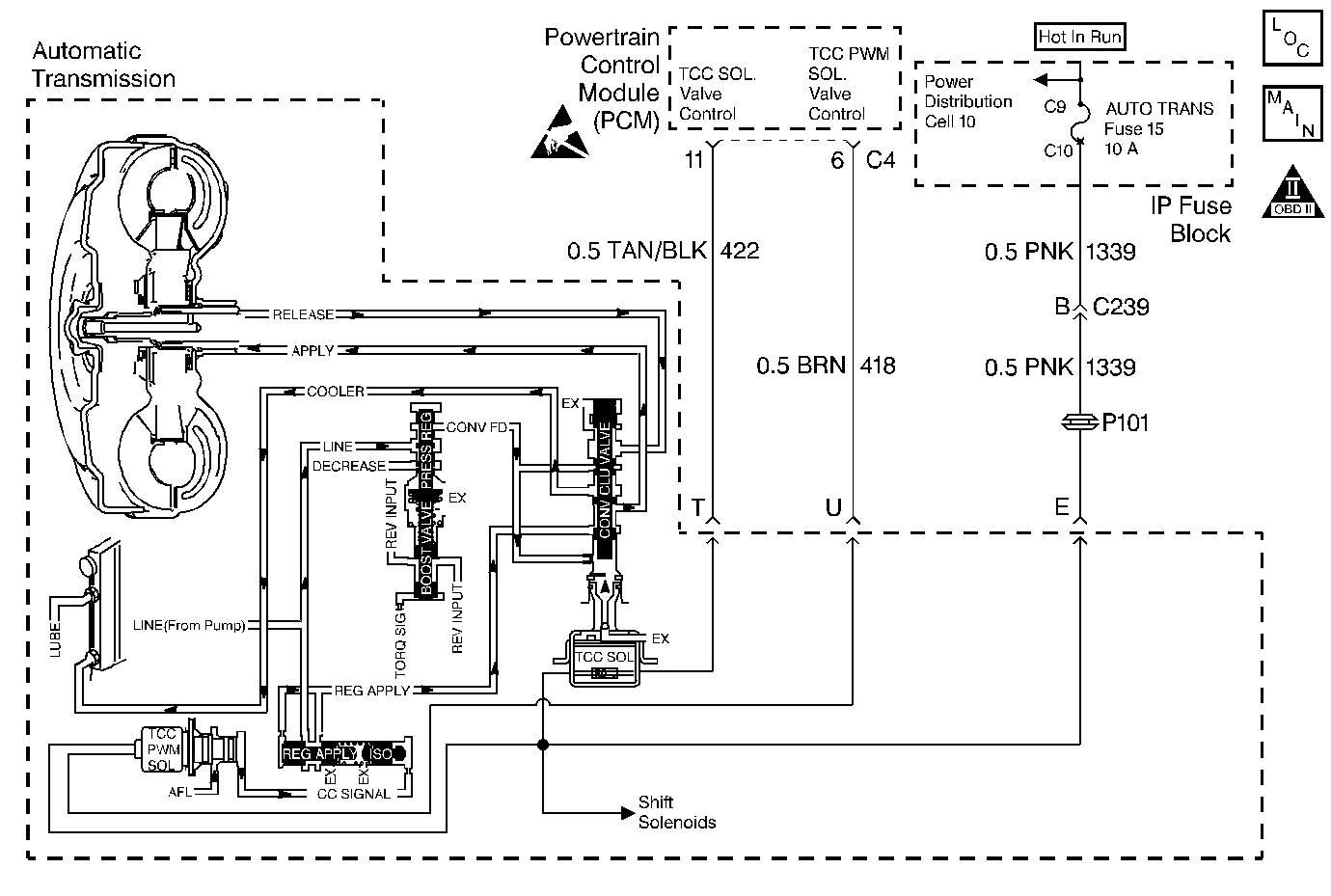
Circuit Description
The PCM monitors the difference between engine speed and transmission output speed. In D3 drive range with the TCC engaged, the engine speed should closely match transmission output speed. In D4 drive range with the TCC engaged, TCC slip speed should be between -20 and +20 RPM.
DTC P1870 detects excessive TCC slip when the TCC should be engaged. DTC P1870 is a type A DTC.
Conditions for Setting the DTC
The following conditions are met for three TCC cycles with reported excessive TCC slip conditions:
| • | No TP DTCs P0122 or P0123 |
| • | No VSS DTC P050 |
| • | No TFT sensor DTCs P0172 or P0173 |
| • | No 1-2 SS Valve DTCs P0751 or P0753 |
| • | No 2-3 SS Valve DTCs P0756 or P0758 |
| • | No TFP Valve Position Switch DTC P1810 |
| • | No TCC PWM Solenoid Valve DTC P1860 |
| • | No TCC Solenoid Valve DTC P1864 |
| • | The engine speed is less than 5500 RPM. |
| • | The engine vacuum is 35-70 kPa. |
| • | The gear range is D4. |
| • | Not in 1st gear |
| • | The TP angle is 13-36%. |
| • | The TFT is 20-130°C (68-266°F). |
| • | The TCC is ON for 0.1 second. |
| • | The TCC is at maximum apply for 0.1 second. |
| • | The Shift Solenoid performance counter is zero. |
| • | The TCC slip speed is greater than 130 RPM for 8 seconds. |
Action Taken When the DTC Sets
| • | Inhibit TCC engagement |
| • | Maximum line pressure |
| • | Inhibit 4th gear if in hot mode |
| • | The freeze shift adapts from being updated. |
| • | The PCM illuminates the Malfunction Indicator Lamp (MIL). |
Conditions for Clearing the DTC
| • | The PCM turns OFF the MIL after three consecutive ignition cycles without a failure reported. |
| • | A scan tool can clear the DTC from the PCM history. The PCM clears the DTC from the PCM history if the vehicle completes 40 warm-up cycles without a failure reported. |
| • | The PCM cancels the DTC default actions when the fault no longer exists and the ignition is OFF long enough in order to power down the PCM. |
Diagnostic Aids
| • | A TFP Valve Position Switch malfunction could set DTC P1870. |
| • | The following mechanical conditions could set DTC P1870: |
| - | A mechanical failure of the shift solenoids |
| - | A mechanical failure of the TCC Solenoid Valve |
| - | A mechanical failure of the TCC PWM Solenoid Valve |
| • | Internal transmission failures may set a DTC P1870. |
| • | An engine misfire may erroneously set a DTC P1870. |
| • | Ensure that the final drive ratio matches the PCM's calibration. |
Test Description
The numbers below refer to the step numbers on the diagnostic chart.
-
This Step compares the indicated range signal to the actual selected range. A faulty TFP Valve Position Switch could set a DTC P1870.
-
This Step tests for slippage while the torque converter is in a commanded lock-up state.
Step | Action | Value(s) | Yes | No |
|---|---|---|---|---|
1 | Was the Powertrain On-Board Diagnostic (OBD) System Check performed? | -- | Go to Powertrain On Board Diagnostic (OBD) System Check , Section 6E3 | |
2 | Perform the transmission fluid checking procedure. Refer to Transmission Fluid Check . Was the Transmission Fluid Checking Procedure performed? | -- | Go to Transmission Fluid Check | |
3 |
Important: Before clearing the DTCs, use the scan tool in order to record the Freeze Frame and Failure Records. Using the Clear Info function erases the Freeze Frame and Failure Records from the PCM. Refer to Transmission Fluid Pressure (TFP) Manual Valve Position Switch Logic. Does each selected transmission range match the scan tool TFP switch A/B/C display? | -- | ||
4 |
Important:: Before clearing the DTCs, use the scan tool in order to record the Freeze Frame and the Failure Records for reference. The Clear Info function will erase the data. Does each selected transmission range match the scan tool TR Switch display? | -- | ||
5 | Drive the vehicle in 4th gear while the TCC is engaged. At any time is the TCC Slip Speed greater than the specified value for 10 seconds? | 130 RPM | Go to System Diagnosis Charts | Go to Diagnostic Aids |
